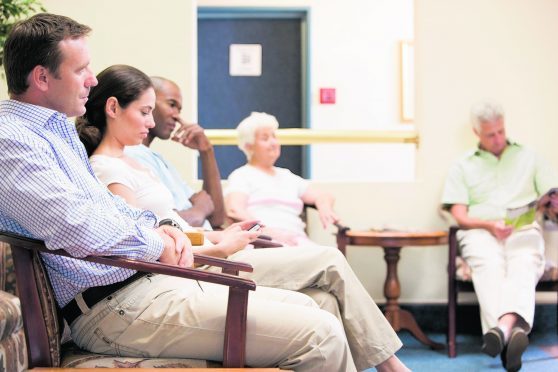The British are notoriously private and prone to embarrassment when it comes to bodily functions, particularly those “down there” – which may go some way to explaining why up to two-thirds of eligible people aren’t taking part in bowel cancer screening.
Despite having been introduced 10 years ago in some areas of the UK – and the fact the programme could save over 2,000 lives a year by 2025 – less than half the people offered the home tests aren’t completing them.
In some communities, uptake is as low as a third, and men, as well as people in deprived and ethnic minority communities, are the least likely to take part.
April’s Bowel Cancer Awareness is aiming to change this, in a bid to help more people detect changes early – which means better outcomes, higher survival rates and even the chance to stop cancer from developing.
A common cancer
More than 41,500 people are diagnosed with bowel cancer, and around 16,000 people die from it every year, making it the UK’s second biggest cancer killer.
However, if it’s caught early, many survive – in fact, there’s a 98% five-year survival rate for those diagnosed at the earliest stage, and by far the best way of catching bowel cancer early is through screening.
“Bowel cancer is one of the most treatable cancers,” stresses Gail Curry, head of health promotion at Bowel Cancer UK. “Screening saves lives by catching it at its earliest stage – when it’s most treatable.”
What’s in a test?
Bowel cancer screening tests, called faecal occult blood tests (FOB), are sent out every two years to people aged 60-74 in England, Wales and Northern Ireland, and to those aged 50-74 in Scotland.
Recipients are required to collect and send back (in the pre-paid envelope provided) three small bowel motion samples – there are instructions detailing exactly how to do this – which are then analysed in a laboratory for traces of blood.
If blood (which can be an early sign of bowel cancer) is detected, there will be further tests. However, even if something does show up, it doesn’t always mean it’ll turn out to be cancer.
“Evidence shows that one of the main reasons for people not doing the test is that they think there’s nothing wrong with them, and they have no connection to bowel cancer. But the test is designed to diagnose any problems before symptoms arise, so just like cervical and breast screening, it’s a prevention method,” says Curry.
The screening can even prevent bowel cancer from developing in the first place, by picking up non-cancerous growths (polyps) which could become cancerous in the future.
Easy business
The idea of collecting a stool sample can be off-putting for some, but Curry urges everybody not to be embarrassed.
“A lot of us have children or pets and have had to deal with their poo, so you shouldn’t be afraid of doing the test on yourself. People aren’t asked to touch it with their hands and it’s very straightforward,” she adds.
“It’s done in the privacy of your own home, it’s not painful – and doing it is a lot better than getting bowel cancer.”
Who gets bowel cancer?
Age is a major risk factor for bowel cancer, with nearly three-quarters (72%) of people diagnosed with the disease aged 65 and over. However, the number of young people developing this form of cancer is rising, so symptoms should always be addressed with your GP if concerned.
A strong family history of bowel cancer is also linked to developing the disease. It’s believed that up to a third of cases may be caused by a change or fault in one or more genes, although it’s usually not known which genes are involved.
People with a history of chronic inflammatory bowel problems, including Crohn’s disease or ulcerative colitis, or polyps (growths on the bowel lining) and type 2 diabetes, may be at higher risk too.
“The majority of bowel cancers start from polyps – but not all polyps turn into cancer,” stresses Curry. “They’re very common and mostly nothing to worry about, but if they get large, the risk of them becoming cancer is higher.”
Lifestyle factors can also increase the risk of bowel cancer, with smoking, drinking alcohol, eating an unhealthy diet and obesity all linked to the disease.
Spot the signs
These symptoms don’t always indicate cancer, but it’s best to get them checked without delay, to be on the safe side…
Bleeding from the bottom and/or blood in your poo.
A change in normal bowel habits lasting three weeks or more, especially to looser or runny poo.
Extreme tiredness for no obvious reason.
Unexplained weight loss.
A pain or lump in the tummy.
Curry says: “People can be afraid or embarrassed if they have blood in their poo, or another symptom “down there”, but doctors see these symptoms all the time. If anyone has any symptoms, they shouldn’t wait for the test kit to arrive, but go straight to their GP.”
For more information, visit www.bowelcanceruk.org.uk. Bowel Cancer UK is urging people to ‘Be A Star, Bake A Cake’ this Bowel Cancer Awareness Month, by holding a bake-off at home or at work to help raise funds. Request a free fundraising pack from the charity’s website.
